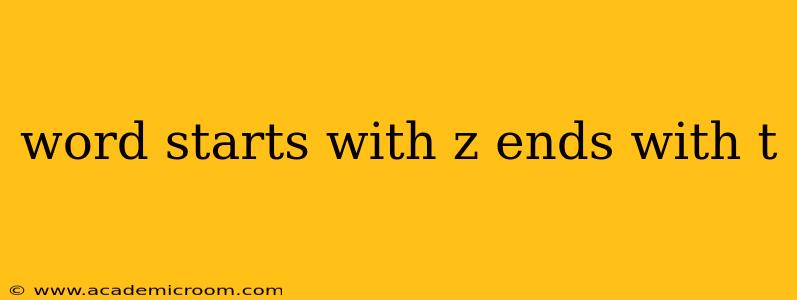Words That Start With Z and End With T: A Comprehensive Exploration
Finding words that begin with "Z" and end with "T" presents a unique challenge. The letter combination is relatively rare in the English language, limiting the number of possibilities. However, let's explore the possibilities and delve into the nuances of word formation.
What are some words that start with Z and end with T?
The most common and readily available word fitting this description is "Zest." This word evokes a feeling of lively enthusiasm and energy, and is frequently used in everyday conversation.
Beyond "zest," the possibilities diminish considerably. We enter the realm of less common words and potentially even neologisms (newly coined words) or words from specialized fields. A thorough search of extensive dictionaries and word databases might uncover obscure terms, but these would likely have limited practical usage outside their specific contexts.
Are there any other words that fit this pattern? Are there any technical terms?
It's highly improbable to find many, if any, other words that naturally adhere to this "Z...t" pattern in standard English. The phonetic and morphological constraints of the English language make such a combination exceptionally rare. The sounds represented by "Z" and "T" don't readily lend themselves to many common word structures.
Technical terms or words from highly specialized fields might exist, but their discovery would require extensive research within niche lexicons. Even then, their widespread recognition and usage would likely be limited.
How can I find more words that start with Z and end in T?
The best approach to finding additional words fitting this unique pattern would involve consulting specialized linguistic resources, such as comprehensive etymological dictionaries or databases of rare and archaic words. However, the likelihood of uncovering many more words beyond "zest" remains slim.
The rarity of this word pattern highlights the complex and fascinating nature of word formation in the English language. The combination of sounds and letter frequencies plays a critical role in the overall structure and distribution of words.
Why are words starting with "Z" and ending with "T" so rare?
The rarity stems from a combination of factors:
-
Phonetic Constraints: The sounds represented by "Z" and "T" aren't naturally conducive to many common word structures within English phonology.
-
Letter Frequency: The letter "Z" has a relatively low frequency in the English language, further reducing the probability of finding words beginning with it.
-
Morphological Limitations: The way words are constructed and derived in English limits the potential combinations of sounds and letters, making "Z...t" an unlikely sequence.
In conclusion, while "zest" is the most readily available word starting with "Z" and ending with "T," the rarity of this pattern demonstrates the intricate nature of word formation and the limitations imposed by the sounds and structure of the English language. Further research in specialized linguistic resources might uncover obscure examples, but their practical use would likely be very niche.
